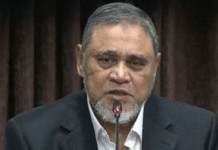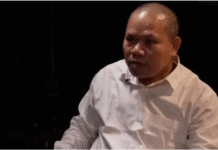Faruque Ahmed
The Supreme Court judgment on arbitrary arrest on suspicion, remand and torture in police custody under Section 54 of Criminal Code of Procedure declaring all such activities as illegal is indeed, a landmark verdict to protect people from unnecessary police harassment, but it will largely depend its compliance by the police.
The court deserves appreciation for making the 19-point recommendations to change police behavior and make criminal laws in consistent with the need of an independent nation and the dignity of its people.
British colonial laws have no place now in an independent country and necessary legislation must be made to bring the changes.
SC order ignored
Arbitrary police actions harassing people and denying their basic rights in fact is disrespect to the country’s independence and the constitution. The police must follow what the court has said in its historic judgment, asking them to earn respect of the people.
The Supreme Court Bench verdict, headed by Chief Justice S K Sinha, has asked the inspector general of police and director general of Rab to circulate the guidelines to all police stations and units for compliance. It has also ordered the registrar general of the Supreme Court to circulate the guidelines for compliance by magistrates and lower court judges.
But it appears that police are not yet ready to comply with the new directives raising doubts about the compliance of the order. Actually, the SC order was ignored by police within three days by picking up seven persons who were released on bail after four years of imprisonment from Barisal jail on charge militancy.
Families said they were picked up by plain clothes DB men but nobody is claiming the arrest showing it to be a case of mysterious abduction. The SC order said whoever will make an arrest from now on should produce the identity cards during arrest if so demanded by the victims.
Law says, arrestee should be allowed to consult a lawyer and see members of his family and nearest relatives must be informed of the arrest within 12 hours. But the families of those persons who were picked up after their release from jail on bail are in total dark and since there is no record of the arrest, it remained a mystery. The SC wanted to give protection to citizens in such situation which made public life terribly insecure in the past, but it has seemingly failed.
Politicos encourage police
However, many believe that SC the order will eventually make impact slowly. Meanwhile, serious efforts are needed to bring the necessary changes in the outlook and mindset of the police and lower judiciary –such as magistrates and judges who deal with police cases. Bangladesh has a good constitution that gives protection to all civic rights of the people. The higher judiciary is also issuing orders from time to time playing the role of judicial activism to check infringement of the peoples’ liberty and streamline police excesses.
But the executive branch of the government – at present as it was in the past—is motivated by political objectives to continue in power and in that endeavour, they mainly use police and lower judiciary to achieve their ends. So police are failing to become people friendly in all such limitations other than a necessary instrument in the hands of the political government to keep people away from challenging its authorities.
The lower judiciary also remained largely subservient to the political government which controls appointment, promotion and posting. The government is not allowing total separation of judiciary from executive branch to control its activities. Consequently the country is lacking the rule of law in bigger part to take full charge of public life and social order as police excesses are making people’s life miserable through whimsical arrest on suspicion, detention and torture in custody. Police are using power breaking constitutional laws in one hand and amassing illegal fortune on the other.
The historic SC rule has unequivocally declared many police actions unlawful and they are also punishable if they break basic law of constitutional protection of people. But it appears that more actions are required from the executive and judicial branches to bring the necessary changes in policies and actions at various levels of the government to enable people to get the benefit of the judgment.
Abuse of law continues
News report said amid widespread allegations of police torture, in 2013 parliament enacted the “Torture and Custodial Death (Prevention) Act” prohibiting both mental and physical torture in any situation and custodial death. But it appears that there has been little application of the law which, as per the SC verdict, is one of the finest laws in the country.
“It is only the magistrates who can ensure its enforceability and see that this piece of legislation does not remain in the statute [law book] only.” The verdict said “magistrates shall not remain as silent spectators whenever they find infringement of this law and shall take legal steps against errant officers.”
Analysts believe that the paradox lies here. They say, we have many laws but are not being applied if and when they appear to be blocking the arbitrary power of police and partisan political objectives of the party in power.
The verdict has therefore laid out detailed guidelines for the magistrates and judges of lower judiciary. It has said judges should not entertain police request for detention if police can’t produce copy of arrest record. This is how most police harassment takes place and the apex court has moved to plug the loopholes. Moreover, no order of shown arrest can be entertained in new cases against a released accused from jail without a copy of new case. This is most widely used practice to arrest politically linked persons in jail gates.
The SC has also ruled for action by judges against police officers for unlawful arrest visibly to harass the person. Moreover no order of detention should be entertained if the arrest is made for preventive detention. This is an instrument police use for detaining persons mostly on political reason citing possibility of participation in unlawful activities but there is no proof that he would be involved. The court has said mere information is not enough.
AL, BNP views converge
The custodians of the laws must not only respect but also protect the rights guaranteed to each citizen by the constitution, the verdict has said. “If we deny the rule of law and the right of the people, we will surely disrespect our long cherished independence.”
The Appellate Division delivered the verdict in May, upholding a High Court judgment on a previous case against law enforcers’ arbitrary use of powers. The HC verdict delivered on April 7, 2003, asked the government to amend some provisions of the Code of Criminal Procedure (CrPC) of 1898.
The verdict came in response to a petition by a group of human rights organizations and individuals after the tragic death of a student of Independent University in police custody on July 23, 1998.
The then BNP-led government had appealed against the verdict and later when Awami League came to power, did the same. But the SC dismissed the appeal.
“If we cannot maintain the fundamental rights of the citizens of the country and allow police officers [to] use abusive power it will be difficult to establish constitutional law and the rule of law in this country at any point of time,” the court has said.
Source; Weekly Holiday









